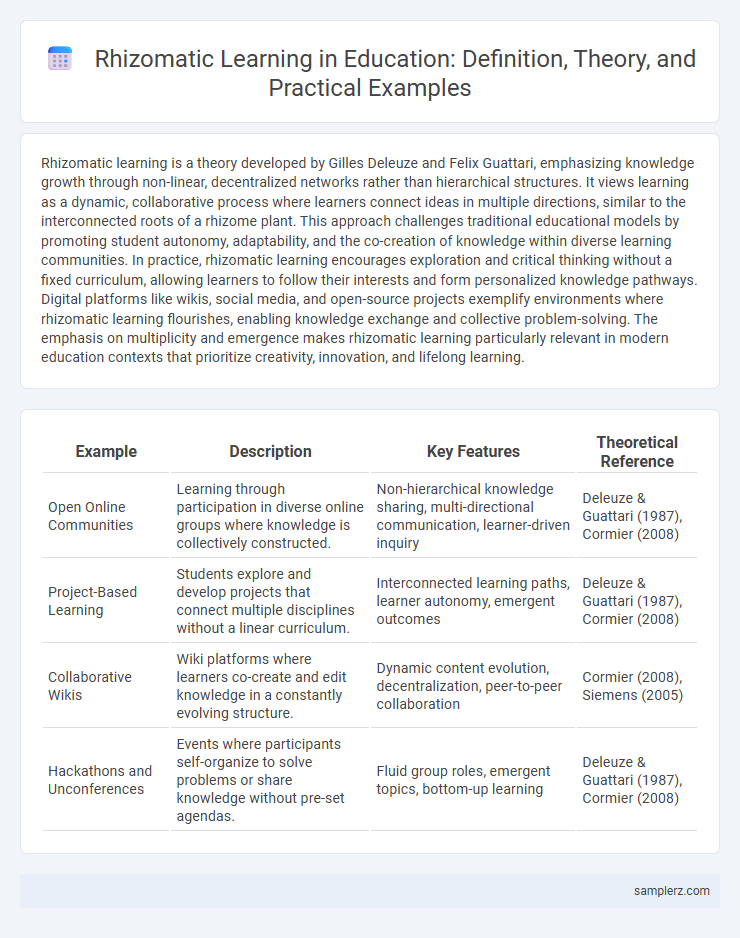Rhizomatic learning is a theory developed by Gilles Deleuze and Felix Guattari, emphasizing knowledge growth through non-linear, decentralized networks rather than hierarchical structures. It views learning as a dynamic, collaborative process where learners connect ideas in multiple directions, similar to the interconnected roots of a rhizome plant. This approach challenges traditional educational models by promoting student autonomy, adaptability, and the co-creation of knowledge within diverse learning communities. In practice, rhizomatic learning encourages exploration and critical thinking without a fixed curriculum, allowing learners to follow their interests and form personalized knowledge pathways. Digital platforms like wikis, social media, and open-source projects exemplify environments where rhizomatic learning flourishes, enabling knowledge exchange and collective problem-solving. The emphasis on multiplicity and emergence makes rhizomatic learning particularly relevant in modern education contexts that prioritize creativity, innovation, and lifelong learning.
Table of Comparison
| Example | Description | Key Features | Theoretical Reference |
|---|---|---|---|
| Open Online Communities | Learning through participation in diverse online groups where knowledge is collectively constructed. | Non-hierarchical knowledge sharing, multi-directional communication, learner-driven inquiry | Deleuze & Guattari (1987), Cormier (2008) |
| Project-Based Learning | Students explore and develop projects that connect multiple disciplines without a linear curriculum. | Interconnected learning paths, learner autonomy, emergent outcomes | Deleuze & Guattari (1987), Cormier (2008) |
| Collaborative Wikis | Wiki platforms where learners co-create and edit knowledge in a constantly evolving structure. | Dynamic content evolution, decentralization, peer-to-peer collaboration | Cormier (2008), Siemens (2005) |
| Hackathons and Unconferences | Events where participants self-organize to solve problems or share knowledge without pre-set agendas. | Fluid group roles, emergent topics, bottom-up learning | Deleuze & Guattari (1987), Cormier (2008) |
Understanding Rhizomatic Learning: Theoretical Foundations
Rhizomatic learning, rooted in Deleuze and Guattari's philosophical concept of the rhizome, emphasizes non-linear, interconnected knowledge acquisition that mirrors natural growth patterns without a central hierarchy. This theory challenges traditional, hierarchical models of education by promoting multiple entry and exit points, enabling learners to navigate information through diverse pathways based on their interests and contexts. The approach fosters decentralized understanding and collaborative knowledge creation, reflecting a dynamic, evolving learning ecosystem rather than a fixed curriculum.
Core Principles of Rhizomatic Learning Explained
Rhizomatic learning emphasizes knowledge as non-linear, evolving through multiple, interconnected pathways rather than a fixed curriculum. Core principles include learner autonomy, where individuals navigate and construct learning paths collaboratively, reflecting the unpredictable nature of knowledge growth. This approach challenges traditional hierarchical structures, promoting adaptability and critical thinking essential for contemporary education.
Non-Linear Knowledge Structures in Education
Rhizomatic learning exemplifies non-linear knowledge structures by allowing learners to navigate information through multiple, interconnected pathways rather than following a predetermined sequence. This approach emphasizes decentralized learning networks where knowledge emerges organically from diverse experiences and interactions. In education, rhizomatic learning fosters critical thinking and adaptability by encouraging students to explore concepts dynamically and collaboratively.
The Role of Community in Rhizomatic Learning Theories
Rhizomatic learning theory emphasizes the role of community as a dynamic, interconnected environment where knowledge emerges through collective exploration rather than hierarchical instruction. In this model, learners contribute diverse perspectives, co-constructing understanding in a fluid network that mirrors the non-linear growth of rhizomes. The community acts as a living ecosystem, enabling adaptability and shared expertise crucial for navigating complex, evolving subjects.
Decentralized Authority in Rhizomatic Educational Approaches
Rhizomatic learning embraces decentralized authority by allowing knowledge to emerge through collaborative networks rather than relying on a fixed curriculum or centralized instructor control. This approach emphasizes learner autonomy, where individuals co-create meaning and knowledge pathways adapt to the evolving interests and contributions of participants. Such decentralization fosters dynamic, non-linear learning environments that mirror the complex, interconnected nature of knowledge itself.
Examples of Emergent Curricula in Theory
Emergent curricula in rhizomatic learning often involve collaborative projects where students co-create knowledge, such as open-source software development communities or inquiry-based science experiments. These examples emphasize decentralized learning paths that adapt dynamically to learners' interests and inputs, promoting interconnected understanding rather than linear progression. This approach reflects Deleuze and Guattari's concept of knowledge as a rhizome, where learning expands through multiple, non-hierarchical entry points.
Learner Autonomy within Rhizomatic Frameworks
Learner autonomy in rhizomatic learning manifests through self-directed exploration and knowledge co-creation within decentralized, non-linear learning environments. This approach rejects hierarchical structures, encouraging learners to navigate multiple pathways and construct personalized understanding based on their interests and experiences. The rhizomatic framework empowers individuals to become adaptive, critical thinkers who continuously reshape their learning journey through dynamic interaction and collaboration.
Knowledge as a Dynamic, Evolving Network
Rhizomatic learning exemplifies knowledge as a dynamic, evolving network by emphasizing decentralized and non-linear knowledge construction. Learners engage in collaborative exploration where ideas continuously connect, diverge, and reconfigure, reflecting the organic growth of understanding. This approach contrasts traditional hierarchical learning models by promoting adaptability, multiplicity of perspectives, and ongoing knowledge transformation.
Theoretical Comparisons: Rhizomatic vs. Traditional Learning
Rhizomatic learning emphasizes decentralized knowledge acquisition through learner-driven exploration, contrasting with traditional learning's linear, curriculum-centered approach rooted in hierarchical pedagogy. In rhizomatic theory, knowledge grows organically via networked connections, supporting adaptability and innovation, while traditional models prioritize standardized content delivery and fixed assessments. This comparison highlights rhizomatic learning's alignment with constructivist theories and its capacity to foster critical thinking, collaboration, and lifelong learning skills in dynamic educational environments.
Challenges and Potentials of Rhizomatic Learning Theory
Rhizomatic learning theory challenges traditional hierarchical education models by promoting decentralized, non-linear knowledge construction, which can lead to difficulties in assessment and curriculum standardization. Its potential lies in fostering learner autonomy, adaptability, and collaborative knowledge creation, making it well-suited for complex, rapidly changing fields. However, educators must balance the unpredictable nature of rhizomatic pathways with structured guidance to optimize learning outcomes.

example of rhizomatic learning in theory Infographic
 samplerz.com
samplerz.com